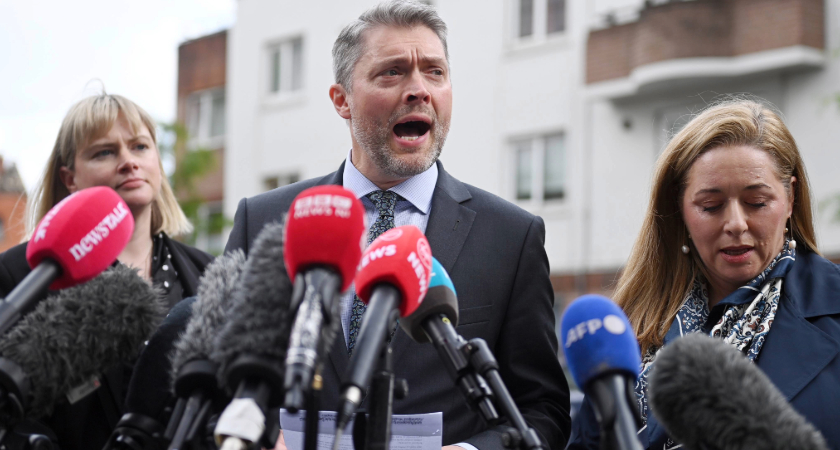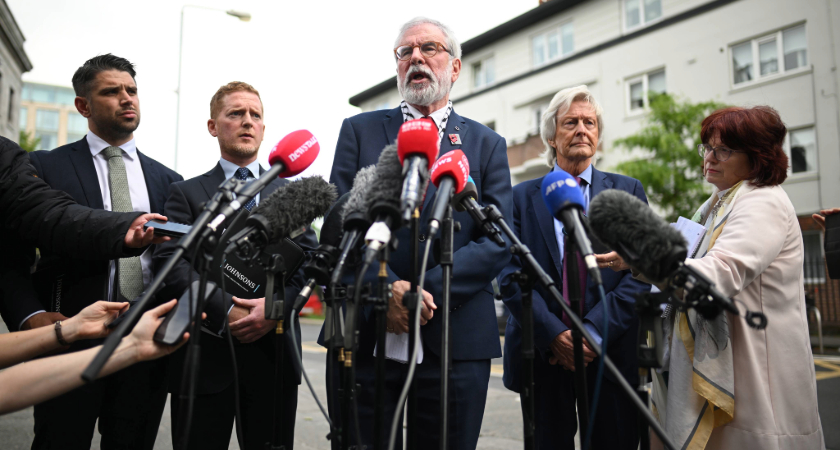FORMER Sinn Féin leader Gerry Adams has said the BBC is 'out of sync' with the Good Friday Agreement after winning a libel case against the broadcaster.
Mr Adams was awarded €100,000 (£84,000) by a jury after it found he had been defamed in a 2016 Spotlight programme and accompanying online article.
Both had reported an anonymous source alleging that Mr Adams had sanctioned the 2006 killing of Denis Donaldson, four months after the former Sinn Féin member was revealed to be an informer for the police and MI5.
The BBC said it was disappointed by verdict, while Mr Donaldson's daughter has called for a public inquiry into his murder.
With the Spotlight programme having been viewed in Ireland, Adams' case was heard at the High Court in Dublin, with High Court libel cases in the state still using use a jury to determine a verdict.
Speaking outside the court on Friday, the 76-year-old said his decision to take the case was about 'putting manners on the British Broadcasting Corporation'.
"I know many, many journalists and I like to think that I get on well with most of them," he added.
"I wish you well and I would uphold your right to do your job.
"But the British Broadcasting Corporation upholds the ethos of the British state in Ireland and in my view, it's out of sync on many fronts with the Good Friday Agreement.
"It hasn't caught on to where we are on this island as part of the continuing process of building peace, justice, harmony and — hopefully in the time ahead — unity."
"I'm very mindful that this case could have been settled," he added.
"The licence payers are going to pay for this. The BBC aren't using their own money, Spotlight aren't using their own money, it's the licence payers.
"As [solicitor] Paul Tweed has said, this could have been sorted out a long time ago."
The BBC reports that the legal bill for the case is believed to be between €3-5m.
'Important that we defend our journalism'
Adam Smyth, Director of BBC Northern Ireland, said the broadcaster had made 'financial provision' for the case but warned the verdict could have 'profound' repercussions for journalism.
"We are disappointed by this verdict," he said.
"We believe we supplied extensive evidence to the court of the careful editorial process and journalistic diligence applied to this programme and accompanying online article.
"Moreover, it was accepted by the court, and conceded by Gerry Adams' legal team, that the Spotlight broadcast and publication were of the highest public interest.
"We didn't want to come to court, but it was important that we defend our journalism and we stand by that decision.
"Our past is difficult terrain for any jury and we thank them for their diligence and careful consideration of the issues in this case.
"The implications of their decision, though, are profound.
 Adam Smyth, Director of BBC Northern Ireland, speaking outside court (Image: Charles McQuillan / Getty Images)
Adam Smyth, Director of BBC Northern Ireland, speaking outside court (Image: Charles McQuillan / Getty Images)"As our legal team made clear, if the BBC's case cannot be won under existing Irish defamation law, it's hard to see how anyone's could. And they warned that today's decision could hinder freedom of expression.
"Of course, a case of this importance, duration and complexity involves significant expense. In common with other media organisations the BBC has insurance and makes financial provision for ongoing and anticipated legal claims."
Last year's Defamation (Amendment) Bill had sought to abolish juries in High Court defamation cases, potentially reducing the amount of damages awarded.
It had lapsed when the last government was dissolved in November but was reintroduced by the current government and is currently at the Committee stage.
The Standard reports that Mr Donaldson's daughter Jane said that by taking the defamation case, Adams had 'trivialised our family tragedy'.
"The plaintiff prioritised his own financial and reputational interests over any regard for retraumatising my family," she said, as she called for a public inquiry into her father's murder.


